| Tissue Specificity | Expressed in all tissues tested, including spleen, thymus, prostate, testis, ovary, small intestine, colon, peripheral blood leukocytes, T-lymphocytes, monocytes, granulocytes and bone marrow mononuclear cells. Highly expressed in brain, with highest levels found in cortex and striatum and at lower levels in cerebellum and brainstem. |
| Post Translational Modifications | Sumoylation at Lys-14 impairs catalytic activity. |
| Function | Accepts ubiquitin from the E1 complex and catalyzes its covalent attachment to other proteins. In vitro, in the presence or in the absence of BRCA1-BARD1 E3 ubiquitin-protein ligase complex, catalyzes the synthesis of 'Lys-48'-linked polyubiquitin chains. Does not transfer ubiquitin directly to but elongates monoubiquitinated substrate protein. Mediates the selective degradation of short-lived and abnormal proteins, such as the endoplasmic reticulum-associated degradation (ERAD) of misfolded lumenal proteins. Ubiquitinates huntingtin. May mediate foam cell formation by the suppression of apoptosis of lipid-bearing macrophages through ubiquitination and subsequence degradation of p53/TP53. Proposed to be involved in ubiquitination and proteolytic processing of NF-kappa-B.in vitro supports ubiquitination of NFKB1. In case of infection by cytomegaloviruses may be involved in the US11-dependent degradation of MHC class I heavy chains following their export from the ER to the cytosol. In case of viral infections may be involved in the HPV E7 protein-dependent degradation of RB1. |
| Protein Name | Ubiquitin-Conjugating Enzyme E2 KE2 Ubiquitin-Conjugating Enzyme KHuntingtin-Interacting Protein 2Hip-2Ubiquitin Carrier ProteinUbiquitin-Conjugating Enzyme E2-25 KdaUbiquitin-Conjugating Enzyme E2(25kUbiquitin-Conjugating Enzyme E2-25kUbiquitin-Protein Ligase |
| Database Links | Reactome: R-HSA-8866652Reactome: R-HSA-936440Reactome: R-HSA-983168 |
| Cellular Localisation | Cytoplasm |
| Alternative Antibody Names | Anti-Ubiquitin-Conjugating Enzyme E2 K antibodyAnti-E2 Ubiquitin-Conjugating Enzyme K antibodyAnti-Huntingtin-Interacting Protein 2 antibodyAnti-Hip-2 antibodyAnti-Ubiquitin Carrier Protein antibodyAnti-Ubiquitin-Conjugating Enzyme E2-25 Kda antibodyAnti-Ubiquitin-Conjugating Enzyme E2(25k antibodyAnti-Ubiquitin-Conjugating Enzyme E2-25k antibodyAnti-Ubiquitin-Protein Ligase antibodyAnti-UBE2K antibodyAnti-HIP2 antibodyAnti-LIG antibody |
Information sourced from Uniprot.org




